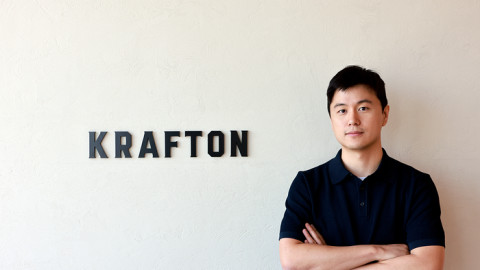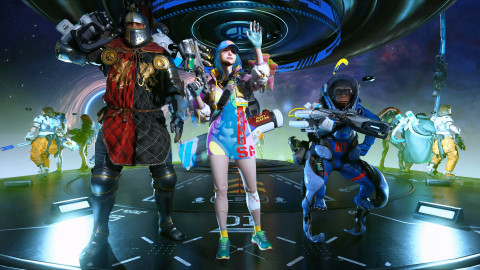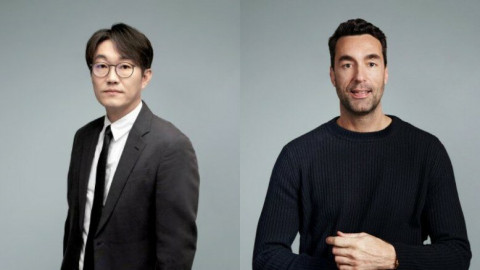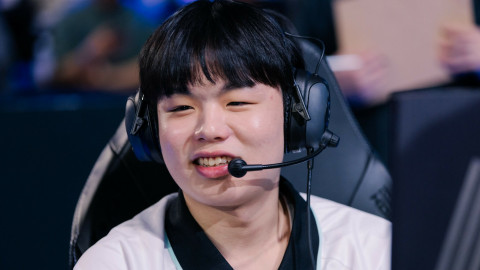
It's not an exaggeration to say that they have conquered all of Asia. Even in the Japanese market, the country that seemed to have shown little to no interest towards the game at first, 'Lineage 2: Revolution' became the most engrossing game. Now, the nozzle has shifted and is now pointing towards North America.
Commonly, the North American and European market is bundled as one as the "Western" market. It's because the two continents follow one another's trends. And of course, this Western market has a wholly different culture compared to the Asian one. One good example is how Asia has recently been releasing and receiving recognition for their RPG games.
The CEO of Netmarble US, 'Shim Chul-Min' has the same opinions. As told and illustrated by Bang Joon-Hyuk during NTP, Revolution is planned to be released in NA on November 15th. The North American market is by far the biggest and most profitable market in the world. Can Revolution leave its mark?
We ran into an opportunity to speak with the CEO of Nermarble US, Shim Chul-Min, in LA.
Netmarble US, to begin its journey in the NA/EU market.
Employing NA/EU residents, understanding the people.
Q. Hello! First of all, I'd like to know just how big and well-established Netmarble US actually is.
Currently, we have 50 employees. However, I'm the only one that came from Korea. Everyone else has been hired in the US. Six years ago, when we first established Netmarble US, we brought our employees overseas from Korea. But this time, in order to get a better understanding of the western culture and its people, we've hired people that actually live here. We're putting a lot of emphasis on "sensibility and emotion" of western gamers. And honestly, we've been utilizing things such as the Cloud System pretty well after we've transitioned to the mobile market, so we didn't really need to bring employees from Korea.
Netmarble US began in 2012 in LA. At the time, our goal was to "pinch" our FPS/MMORPG games and stick it in somewhere in the western market. But we soon learned that spreading our games and getting it well-known was not a simple task. It was extremely difficult. Of course, including Steam, there were a lot of popular platforms, but to "find your own place" was a different story.
As time passed, our company decided to switch our direction towards mobile games. So at around 2014, Netmarble US also began transitioning to the mobile market. We traveled to San Francisco and met with mobile game developers, platformers, and many different companies to learn from them.
Due to language/translation issues, Netmarble US was run in both LA and SF. Then, during the Spring of 2016, the two offices were combined into one. Our office is currently located in Buena Park, and we're focusing on publishing mobile games.

Q. I see. I was wondering why the employees here felt so different to the ones back home! When you guys were talking about the model of the game, I remember how you've mentioned that you'll be hiring a PM and director that lives in NA.
You're correct. Our focus is to release a game that is appealing to the western audience. We're currently fixing Revolution so that it'll appeal to them.
It's not just simple "translation" but a process that completely westernizes the game. Just for this cause, we have an entire PM team dedicated to it. The team analyzes what is trending in the west, then, after deciding on what to change, they communicate with the company back in Korea to make adjustments.
Also, our plan of sale, management of the game, and marketing will all be focused on the sensibility and emotions of the western audience. The thing with marketing is that: you can never get too close to a region if you're not actually there. Like the recent TwitchCon or advertisement companies; if you're not a westerner yourself, it'll be very difficult to approach the audience in that country. Also, in addition, we're trying to establish and manage our own social media for the players.
Translation is also another important factor in developing this game. We first translate the game to English, then it's translated into Russian or European countries' language. We kind of act as a "translation hub". We're acting as the gateway between Korea and the other regions.
Q. In a way, I guess you would be the very first to truly see and understand the difference in culture between the two regions. While working together with foreigners, I'd expect you to have collided with the workers here; in another word, culture shock.
I didn't know at first, so it was definitely a surprise. Though I now came to understand the differences as I've stayed here for 6 years. (Laughs) I first saw how different our culture was when I started sharing conversations with the workers. So at the beginning, I was often confused by their statements.
Americans don't tend to have small conversations like Koreans do; giving ideas one by one. Instead, they give long and thought-out ones. For example, in Korea, workers talk to me by giving me small reports condensed into a single sentence. But here, they give me a detailed "this and this caused this and this to happen. Because our results ended up being like this, we'll start working towards 'that' now." A report like that could be considered "uncanny" in a way in Korea.
I think this difference has stemmed from the two different education system of the two regions. People here in America has learned a lot about debates, presentation, and essays during their academic years. I think that kind of education created the unique culture that exists now in NA. It's not similar to Korea, but it's also not the complete "American style".

Q. Are there cultural differences between the gamers from the two regions as well? Like a difference that comes from the different lifestyles?
Yes. Normally, NA users tend to play their mobiles games at home. One reason is that their mobile connection could be cut off relatively fast and unexpectedly when outside; like when entering a building. Also, they spend a lot of their time driving; their public transportation system isn't as good as the ones in Korea and Japan. Due to the limitations of the environment, they usually play mobile games at home.
When I first began "studying" the western market, I heard from others that it's completely different to the Asian market. So I was already expecting big differences to come my way when I first arrived here. But it wasn't exactly what I heard. Sure, the timezone may be different, but the tendency of the two markets started growing similar to one another. Then I understood that if the content you're providing is good enough, it'll be loved by everyone regardless of the region.
And of course, there are differences. One big example is the "visuals" of a game. In Asia, people prefer either cute looking characters or "revealing" female characters - even if she's supposed to be a warrior. But here in NA, if they hear "female warrior", they expect a muscular woman - an actual warrior. The difference in preferences probably came from the historical background of the two cultures. But then again, due to the constant import of Asian games here, the preferences of western gamers are starting to lean closer to the Asian ones.
The current "hot" here in NA is "online competition". Unlike in the past, a lot of gamers have started to take interest in it. This is something that trended in Asia long before NA, and now, NA has started adopting this trend.
Q. So what you're saying is that: there are obvious differences in culture, but in some areas, the two regions are coming closer to each other. If that's the case, shouldn't communication between you guys and Korea be of the most importance? I'd expect it to be very difficult due to the timezone differences. I'm very curious about how you guys work around it.
It was very difficult at first - because we work during different times. But including our office in Turkey and Korea, a lot of our cooperating companies have taken timezone into consideration.
Should I say it's because of experience? We're adjusting our schedule so that we can communicate. Just recently, when daylight savings came to an end, it was 5 PM here. It was 10 AM in Korea. As we became more and more aware of these kinds of culture/tradition, we overcame the difficulties that we originally had. In addition, we began benchmarking other global corporations and have been adjusting our company to make it as efficient as possible.

Lineage 2: Revolution, Coming to North America on November 15th.
Netmarble's sales strategy, will it truly work in NA?
Q. In the western market, instead of releasing a "gateway" RPG like 'Phantom Gate' first, you guys straight-up released a very heavy game, Revolution. What made you guys take this path?
To be honest, Revolution was also an "attempt" at first when it was released in Korea. It was a big risk, but it ended up being a huge success. Lineage 2: Revolution led the mobile MMORPG genre in the Korean market. It was also a success in Japan and other Asian countries.
We were "inspired" to challenge the other markets due to the previous success that we had with the game. Having started from the beginning of this year, many RPG games have been released here. And although the results of those games weren't too dynamic, those games have widened the genre quite a bit. Gross from RPG games has leaped double the amount through the last 3 years. This is proof that gamers have started to have taken interest in the genre. That's why we decided to release Revolution here in the NA market.
For a couple of years, NA gamers have been getting used to the mobile RPG genre. They're playing RPGs that were launched by both us and other companies. Netmarble's 'Marble Future Fight' is a game that utilized an NA IP but has a game mechanism that derived from Asia, and it has gotten a lot of traction from NA users.
Netmarble does not want to become a "follower". That's why we challenged the market with something brand new - that's why we decided to release Lineage 2: Revolution.
Q. 'Lineage 2: Revolution' reached over 1.5 million pre-registrations. What does this number mean to you guys?
Here in NA, unless the game is built on a solid and popular IP, it's very rare for it to have over 1 million pre-registration. And for a game that is not named: Star Wars, Marvel, or Disney to have exceeded over 1 million in pre-registration as an MMORPG is definitely a meaningful result.
Our method of advertisement isn't too different from the one that we used back in Korea, such as utilizing an advertisement network through Facebook. At the same time, we've been "teasing" gamers that are currently playing RPG games that are similar to Revolution. Our recent show at TwitchCon was a huge help to get our game viral. Google's pre-featuring was also big.
First of all, western gamers tend to understand the mobile MMORPG genre differently to us. They tend to mistaken and categorize games such as Machine Zone's 'Game of War' as an MMORPG. We showed the big battles that happen in Revolution during our show on TwitchCon, and it was a huge help to get the gamers to understand.

Q. In Korea, a lot of gamers were very intrigued when they saw Conan O'Brien as the model for Lineage 2: Revolution during TwitchCon. What was Conan's initial reaction when you offered him the position?
I'll tell you the background information first. Before introducing Revolution to the western audience, we went through a lot of consideration in trying to find the best and innovative way to do so.
One of our options was to use a famous person to promote our game, and out of the many celebrities that we've had listed, Conan seemed like the most appropriate one to get the job done. Conan himself is a gamer that is creating content for others, and he even operates 'Clueless Gamer'. But out of everything, the biggest merit was that he is a gamer.
The one problem that we ran into was that: Conan was way too famous. (Laughs) It took us quite a bit of time to gain a connection with him to work with him. He was just too famous... But in the end, after seeing our game, Conan decided to work with us. And as you all may know, Conan made a surprise appearance at TwitchCon.
When he first saw our game, Conan said, "The graphics are amazing. Wow, multiple players can play online simultaneously? It's also very easy! I think even my son can play this!" I think Conan was surprised by the elements that are missing from western mobile RPG games: great graphics, great accessibility, and a very large-scale online playability.

Q. In what ways did you make the adjustments to "westernize" Lineage 2: Revolution?
We approached the game from 3 directions. We began by making adjustments to the visuals of the game. Starting from colors, we made adjustments to armors and weapons. Also, western gamers pointed out that the male characters of Revolution were too "cute" and not manly. So we made adjustments to better fit their preferences and culture. We also made the female characters less revealing.
The UI/UX was also something that we had to change. The UI that Koreans are so used to, is considered to be "too much information" for a lot of western gamers. We received a lot of feedback that the players were feeling overpressed and burdened by the massive amount of information on the screen. So we adjusted it and made it simpler.
The overall mechanics of the games were also adjusted. In Revolution, the end-game content includes large-scale wars - like siege wars. A lot of Asian players spent a lot of resources to get to that content as fast as possible. But if we don't provide a proper introduction that teaches the players so that they can adapt to the system effectively - for the western gamers that aren't too used to mobile MMORPGS - can lead them to quit the game before even reaching that end-game content.
So in order for the players to experience such contents earlier, we included them throughout the game, so that they can get a taste of it as they progress through the game. We did that by opening up raid bosses or letting them join siege wars even when they're low-leveled. So we had to do a lot of re-balancing.
We can address this as the "differences in enjoying a game". Asian players tend to rush through the earlier contents of a game to reach that end-game as soon as possible. On the other hand, western players tend to rate highly of the earlier parts of a game, just as much as the late-game content.
Lastly, after analyzing the general playstyle and "patterns" of western players, we made adjustments to the game. In Asia, players favor the 'auto-play' system - because they often utilize public transportations. But western players, on the other hand, don't play too many games while on the move, because they're often driving for themselves. Most workplaces also have strict rules against playing games at the office.
Therefore, unlike Asia, western players have less playtime; leading their characters to develop slower. So we made adjustments to make sure that their characters develop at a good pace.
To put everything said in one sentence: "Western Lineage 2: Revolution is awaiting launch with modified UI/UX, visuals, and pace of character growth.

Q. What are you guys focusing on to take a strong stance in the NA/EU market?
Like how we've selected Conor O'Brien as the model of the game, we're constantly planning ways to introduce the mobile MMORPG genre to the gamers and popularize it. Not only are we planning to spread the RPG trend to other gaming organizations, but also every organization that is related to gaming. It's true that the western audience is unfamiliar with the Korean-style RPG games... But it has started to receive acceptance, and other game developers have started working on RPG games as well.
Q. The western gamers are probably unfamiliar with the 'auto-battle' system as well. For us Koreans, 'auto-battle' and even 'auto-quest tracking' is a major convenience. But for westerners, wouldn't they take a different approach to the whole thing?
Looking back at the launch of 'Marvel Future Fight', the feedback from the players were cut half and half; some preferred the system while some didn't. It's been two years since then, and the system is now more widely accepted. In a way, we sort of led that to happen. Normally, western gamers prefer playing their game physically and manually. However, a lot of recently released games feature this 'auto-battle' system. The market is evolving. I expect a lot of players that come to Revolution to be already familiar with the whole 'auto-pilot' mechanic.

Natmarble US aims to reach the top of the chart with a mobile MMORPG title
Not as a follower, but as a pioneer... "A challenging attempt"
Q. One of Netmarble's method to popularize the genre in the west was to utilize a popular IP. This reminds me of games such as 'Marvel Contest of Champions' and 'Star Wars: Force Arena'. Has Netmarble US set up a path for this method?
Star Wars, Marvel, and Disney are the most powerful IP in NA. We have been actively looking at a lot of different IPs; even including TV shows. And not only are we looking at IPs, but we've been looking at other studios to expand our company. "Can a certain studio synergize well with Netmarble?" "Do we share a similar goal?" We are planning to invest in a studio that fits the description I've mentioned.
As said during NTP, I believe that Netmarble US is in charge of popularizing the mobile RPG genre to the world. If Revolution ends up being a successful launch here in NA, the RPG player base will grow bigger, creating more opportunities for the future.
We're competing against games that carry a powerful IP, such as Star Wars, Marvel, and Disney. It's definitely going to be a challenge. Furthermore, by launching games similar to 'Firstborn: King Come', we'll continue to try and expand both the softcore and hardcore player base.
Q. Through the 'Lineage 2: Revolution' launch on November 15th, you've said that you will take charge of the mobile MMORPG market here in NA. I want to hear how you feel before the release.
Recently, Korean PC games have been getting a lot of traction here - and I don't feel limited just because we're bringing a mobile game. I truly believe that we have a chance with our well-crafted contents.
I'm taking every measure to make sure that Netmarble US would be successful here. I know for sure that we can reach the top of the charts with a mobile MMORPG.
Of course, the journey ahead won't be an easy one. However, back in Asia, the Japanese market was also a difficult challenge, but in the end, we overcame it. The same applies to NA. It's definitely a hard market, but if we truly do our best, I see it happening.
To make sure that 'Lineage 2: Revolution' becomes the no.1 mobile game in NA, we'll do our absolute best.
Sights of the Netmarble US






Sort by:
Comments :0







